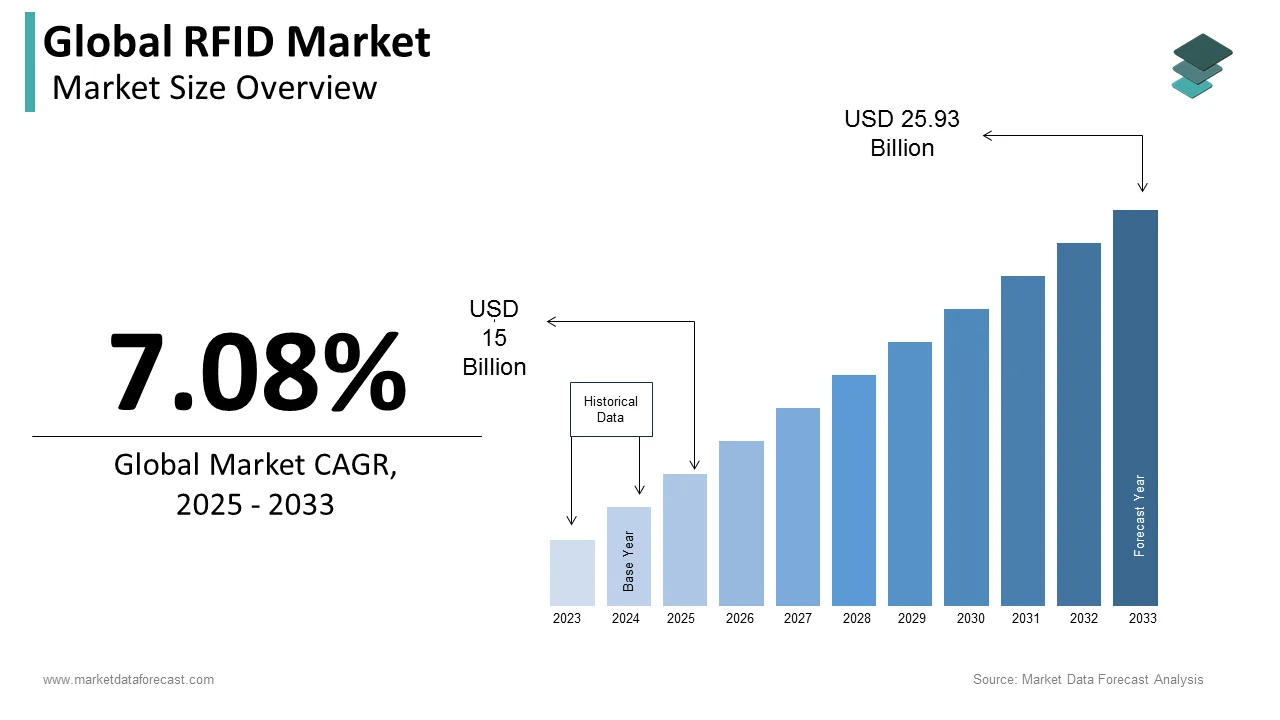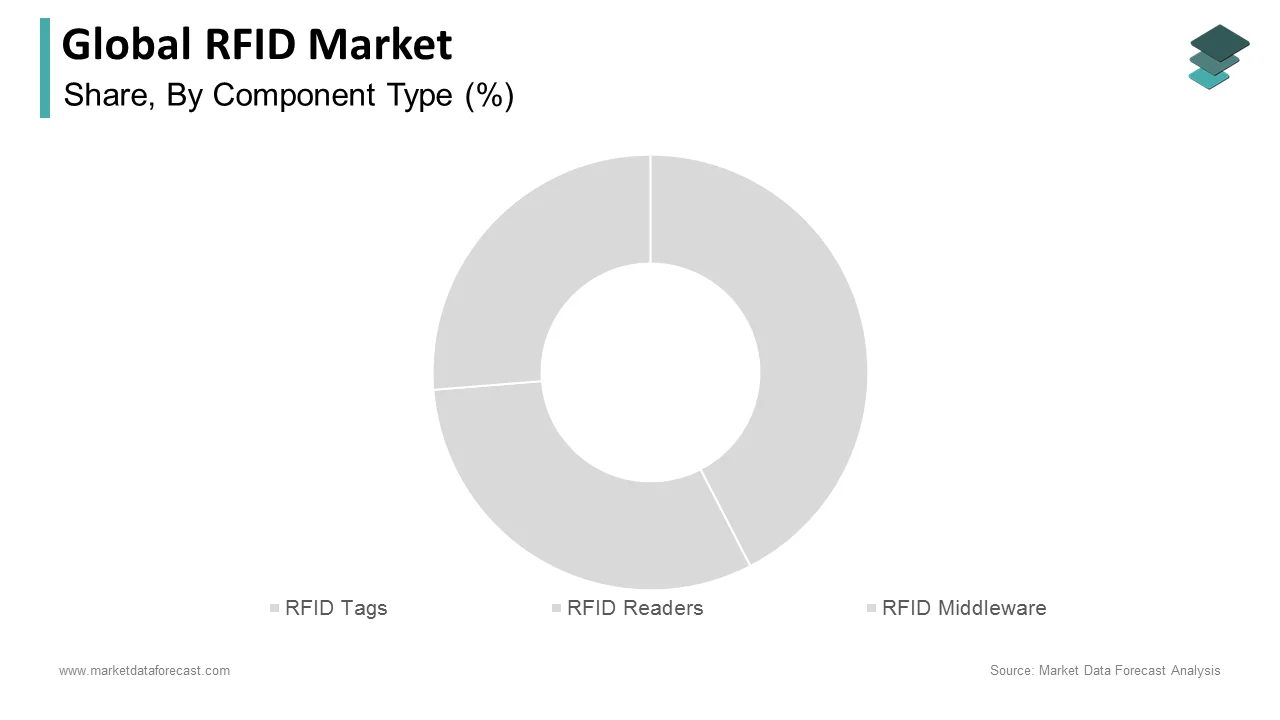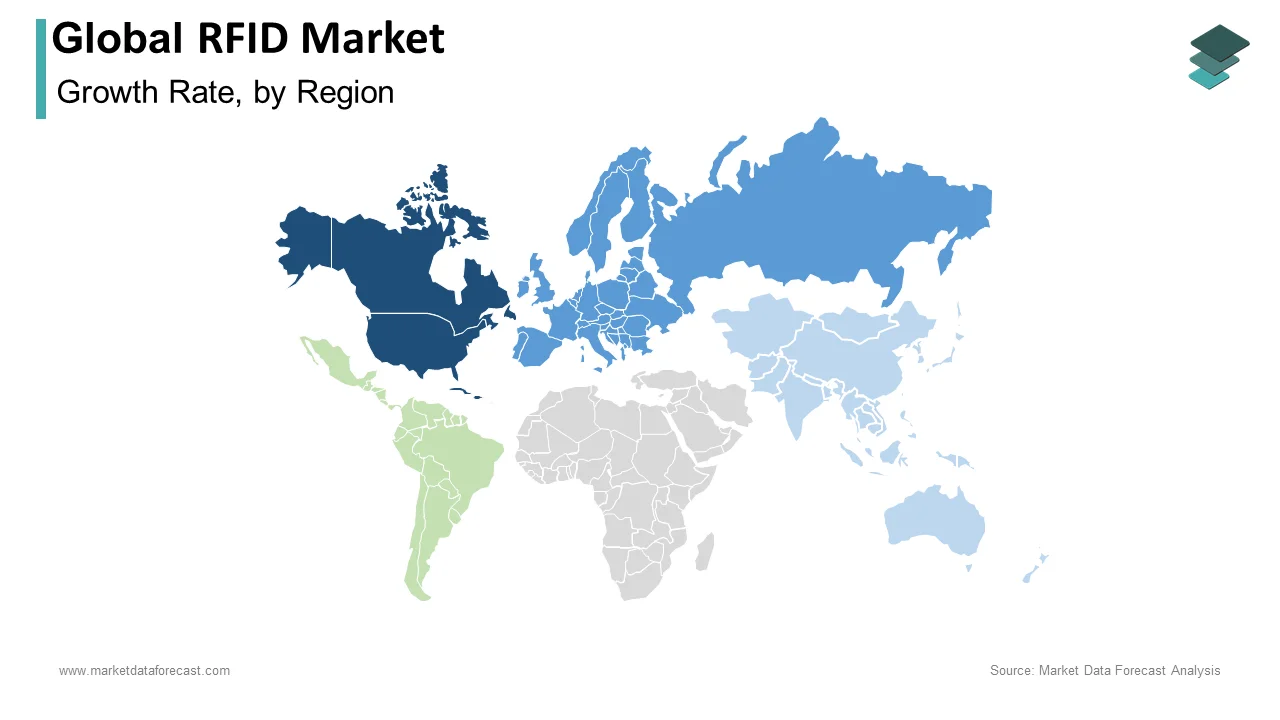Global RFID Market Size, Share, Trends & Growth Forecast Report By Component, Tag Type, Industry and Region (North America, Europe, Asia-Pacific, Latin America, Middle East and Africa), Industry Analysis From 2025 To 2033.
Global RFID Market Size
The size of the global radio-frequency identification (RFID) market was worth USD 14.01 billion in 2024. The global market is anticipated to grow at a CAGR of 7.08% from 2025 to 2033 and be worth USD 25.93 billion by 2033 from USD 15 billion in 2025.

RFID or Radio frequency identification is a technique that collects digital data using radio waves in RFID chips or smart tags, which have an integrated circuit and an antenna for transmitting data to the RFID reader. Like barcodes, RFID tags store a large amount of information, and readers can be integrated into the architectures, mobile poled, or top mounted. The tags are incorporated into animals, products, or humans for identification and data collection, an advanced industrial and consumer application solution.
MARKET DRIVERS
The evolution of Industry 4.0 to augment the global RFID market growth.
Factors such as the growing adoption of RFID tags for the Internet of Things, Industry 4.0, and smart manufacturing solutions, increasing government initiatives for various industries promoting the usage of RFID, rise in the installation of RFID solutions in the healthcare and manufacturing sectors, and competitiveness leading to the availability of cost-effective RFID solutions globally are some of the major factors propelling the RFID market growth.
Even though high initial investments may hamper the growth, the evolution of Industry 4.0 brings more connectivity, security, and intelligence which notably drive the growth of the RFID market. In addition, RFID has gained more functionality, and the tags enable flexible manufacturing of products to facilitate a higher degree of standardization. They can also be transformed into smart sensors to track the temperature and real-time location, thus increasing the overall efficiency of manufacturing processes at a lower cost, which drives the RFID market growth.
Implementation of RAIN RFID, a very effective device in the retail tracking containers by car manufacturers, by eliminating time-consuming human intervention, wide adoption of RFID in the aviation industry for Boeing, Airbus, and other defense planes to improve work in progress (WIP) tracking and logistics management are some of the other significant reasons which drive the growth of the RFID market.
Furthermore, the growth of the RFID market is also expected to be driven by the growing adoption of RFID tags in the healthcare sector for medical equipment management, growing demand for RFID technologies in end-use industries, more focus on integrating connective technologies such as the Internet of Things (IoT) for the optimal identification of assets facilitation across different sites in real-time.
MARKET RESTRAINTS
High Costs and Data Security Concerns Limit Market Growth
The cost involved in manufacturing and installing RFID tags, rising concerns over data security and privacy, the much expensive RFID technology barcode readers, and additional hidden costs of maintenance, monitoring, licensing, data management, and implementation training are some of the major restraints to the growth of RFID market. RFID middleware is needed for managing and transferring data without redundancy, which affects supplier profit margins due to costs incurred by suppliers, which, in turn, negatively affects market growth.
REPORT COVERAGE
|
REPORT METRIC |
DETAILS |
|
Market Size Available |
2024 to 2033 |
|
Base Year |
2024 |
|
Forecast Period |
2025 to 2033 |
|
CAGR |
7.08% |
|
Segments Covered |
By Component Type, Tag Type, End-User, and Region. |
|
Various Analyses Covered |
Global, Regional, and country-level analysis; Segment-Level Analysis, DROC; PESTLE Analysis; Porter’s Five Forces Analysis, Competitive Landscape; Analyst Overview of Investment Opportunities |
|
Regions Covered |
North America, Europe, APAC, Latin America, Middle East & Africa |
|
Market Leaders Profiled |
Honeywell International Inc, Checkpoint Systems, Inc, Alien Technology, LLC, Brady Worldwide, Inc., Confidex Ltd, AVERY DENNISON CORPORATION, HID Global Corporation, Impinj, Inc, IBM Corporation, Invengo Technology Pte Ltd., NXP Semiconductors, Protrac Id, ACTATEK (UK) Ltd., BT, Datalogic SpA, RFID, INC, Siemens, Smartrac NV, and TagMaster, and Others. |
SEGMENTAL ANALYSIS
By Component Type Insights

Based on component type, the RFID tags segment is anticipated to dominate the market during the forecast period. These tags are the cheapest, most used, and most found for assets in hospital equipment, computer parks, industrial hardware, medicines, industrial equipment, data center, and others. Being single-use or tear-proof, RFID tags are highly adopted across all end-user industries.
On the other hand, the RFID readers segment is also projected to showcase a healthy CAGR during the forecast period. A radio frequency identification reader (RFID reader) collects information from a radio frequency identification tag (RFID tag) to track individual objects by transferring tag data to a reader. Therefore, even the use of RFID readers is presumed to grow along with RFID tags.
By Tag Type Insights
Based on the tag type, the passive RFID tags segment is anticipated to show a high growth rate since they show stable revenue growth, are powered by energy generated by radio waves instead of a battery, and are comparatively cheaper track products in several end-use industries. They are tuned to RFID tag frequency, and readers connect to antennas that broadcast the RF field.
The active tags segment is also expected to dominate this segment owing to the higher frequency purchase of active RFID tags than passive RFID tags since the technology is battery-powered and hence can be read in a higher frequency range through readers by continuously transmitting their signals. They also help in tracking the real-time location of assets in high-speed environments.
By End-User Insights
Based on the end-user, the logistics and manufacturing segment led the market in 2024. The expected dominance of this segment is due to the high adoption of tracking systems by logistics organizations to track and monitor their cargo in transit. Companies also use sensor-based RFID tagging systems to monitor environmental conditions around transported products. Any deviations in the properties or external parameters are reported to interested parties so that appropriate measures can be taken to avoid damage. In addition, RFID tags have helped government officials monitor assets and classify the legal supply of products. These measures to prevent product loss in transit have contributed significantly to adopting RFID tags in logistics and supply chain applications. The Logistics and Supply Chain segment includes using RFID tags in applications such as post and courier, asset tracking, cargo tracking, container tracking, and other supply chain activities. RFID solutions help industries optimize their supply chain by better managing warehouse inventory, tracking shipments, and optimizing the best supply chain route.
According to the IMF, demand in the retail sector will continue to accelerate over the forecast period. In addition, these tags carry a unique product number, through which payment and inventory are managed. As a result, IoT-enabled sensor-based labels are in high demand in the retail industry, and the trend is expected to continue in the coming years.
Real-time product data management and accessibility in retail improve inventory optimization, asset management, and location tracking. Due to these advantages, large and small retailers are actively adopting RFID tags and readers, thereby driving the market's growth. In addition, RFIDs in the retail industry are used to track in-stock products through which the product can be identified and traced back to delivery to various department stores. For example, all major Walmart stores in the United States (US) use RFID technology to track merchandise and shipment until it is delivered to significant stores.
REGIONAL ANALYSIS
The North American region accounted for the most significant share of the global market in 2024 and is expected to grow at the highest CAGR during the forecast period.
The dominance of this region can be credited to the presence of major key players in the region, the increasing adoption of RFID tags in aviation for baggage handling and logistics to prevent the loss, improving asset management, and the heavy investments by organizations and government institutions.
In the region of Europe, an increase in international tourism leading to high usage of RFID tags which are used to track passenger information, baggage, and other items to improve security and accommodation, increasing the adoption of RFID tags in vehicles for automatic detection of road and highway toll, and rise in demand for these tags in hospitality industries for tracking patients records are some of the major factors due to which the global radio frequency identification market is anticipated to grow over the forecast period.
The region of Asia-Pacific is anticipated to show the highest growth rate during the forecast period because of the increase in investments for the expansion of business activity and the creation of more investment opportunities due to the investment of several companies in the development of advanced products.
Moreover, the adoption of Industry 4.0 and other smart factories facilitates the growth of the RFID market. China and Japan have the largest market share for RFID tags in this region due to the early adoption of RFID solutions in the healthcare and retail sectors.
The regions like Latin America, the Middle East, and Africa are also expected to rise in the market due to the growth of the Internet of Things based on various reasons like an increase in investment and government support, increased demand for higher-speed connectivity, increased demand for smart devices, and government's growing propensity to develop the industry further.
KEY MARKET PARTICIPANTS
Honeywell International Inc, Checkpoint Systems, Inc, Alien Technology, LLC, Brady Worldwide, Inc., Confidex Ltd, AVERY DENNISON CORPORATION, HID Global Corporation, Impinj, Inc, IBM Corporation, Invengo Technology Pte Ltd., NXP Semiconductors, Protrac Id, ACTATEK (UK) Ltd., BT, Datalogic SpA, RFID, INC, Siemens, Smartrac NV, and TagMaster are some of the noteworthy companies operating in the global RFID market.
RECENT HAPPENINGS IN THIS MARKET
- In October 2022, Toppan launched Near Field Communication (NFC) tags which are attachable to metal or small containers. The company provides packaging, communications, decorative materials, security, and electronics solutions and has also launched smart packaging solutions with a cloud-based identity authentication platform.
- In October 2022, Radio Frequency Identification System has been recently installed at the Rail Mail Service (RMS) Transit Post Office Ambala, under Haryana Postal Circle, for a contactless, real-time tracking and tracing of postal bags by using single-use plastic seals used to close the postal bags and other authentication devices. As a result, the RMS became the first Cantonment Station to have an RFID system in Haryana.
MARKET SEGMENTATION
This research report on the global radio-frequency identification (RFID) market has been segmented and sub-segmented based on the component type, tag type, end-user and region.
By Component Type
- RFID Tags
- RFID Readers
- RFID Middleware
By Tag Type
- Passive Tags
- Active Tags
By End-User
- Logistics and Manufacturing
- Retail and Consumer Goods
- Healthcare
- Aerospace and Defense
- Government
- Others
By Region
- North America
- Europe
- Asia Pacific
- Latin America
- Middle East and Africa
Frequently Asked Questions
Which are the significant players operating in the RFID market?
Yes, we have studied and included the COVID-19 impact on the global RFID market in this report.
Related Reports
Access the study in MULTIPLE FORMATS
Purchase options starting from $ 2500
Didn’t find what you’re looking for?
TALK TO OUR ANALYST TEAM
Need something within your budget?
NO WORRIES! WE GOT YOU COVERED!
Call us on: +1 888 702 9696 (U.S Toll Free)
Write to us: [email protected]

